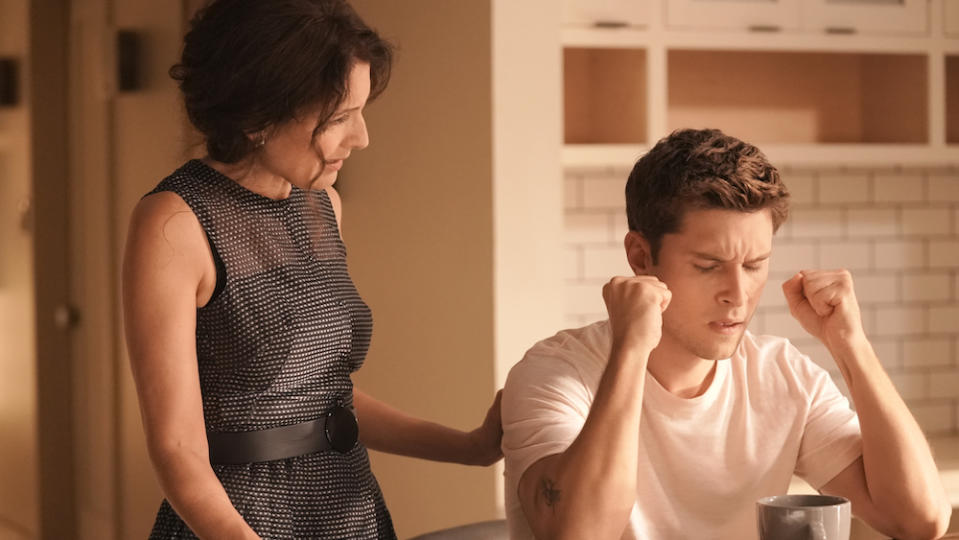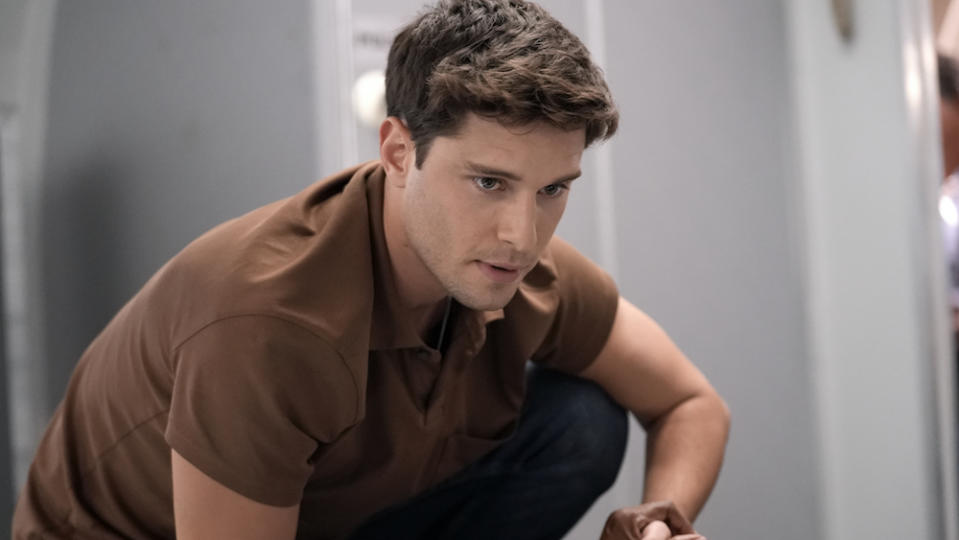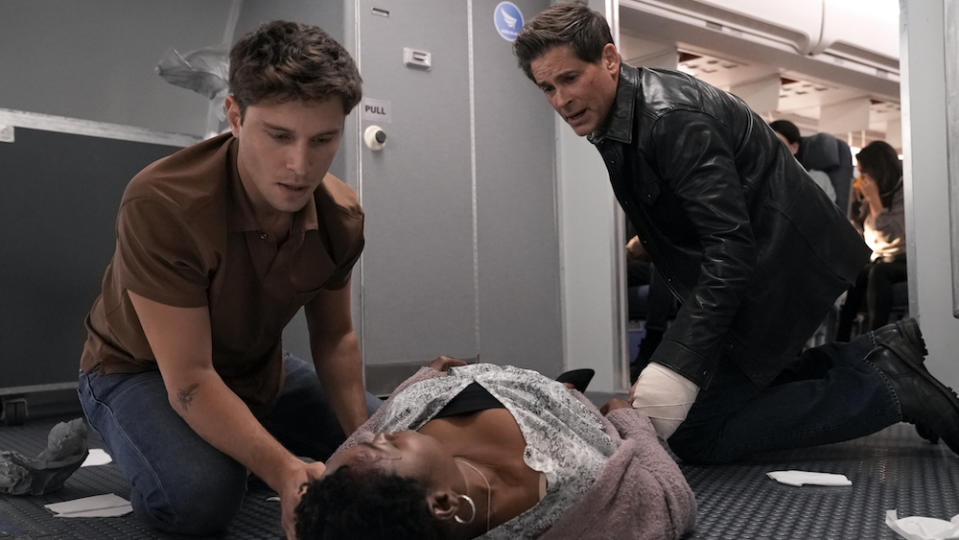‘9-1-1: Lone Star’ Stars Ronen Rubinstein, Lisa Edelstein on Heartbreaking T.K.-Gwyn Flashback and That Big Goodbye

SPOILER ALERT: Do not read if you have not watched “In the Unlikely Event of an Emergency,” the Feb. 28 episode of “9-1-1: Lone Star.”
Gwyn Morgan (Lisa Edelstein) went as far as she could with her son, T.K. Strand (Ronen Rubinstein), on Monday’s “9-1-1: Lone Star” before leaving him to go the rest of the way on his own — both in the past and the present. Monday’s episode featured two parallel storylines, one in which a devastated T.K. and Owen (Rob Lowe) are heading to Gwyn’s funeral on a plane from Austin to New York City in 2022 following her sudden off-screen death on last week’s “Lone Star,” and the other a flashback to 2017, when Gwyn flew detoxing heroin addict T.K. to rehab from New York to California.
More from Variety
In both storylines, T.K. has to accept the fact that his mother cannot physically be there for him in his time of need — but that she’s given him what he needs to take care of himself and others from here on out. Variety spoke with “9-1-1: Lone Star” showrunner Tim Minear and actors Rubinstein and Edelstein about the big episode, which marked Edelstein’s exit from the “9-1-1” spinoff series.
What was your reaction to Gwyn being killed off and the news of how it would be done?
Ronen Rubinstein: It started with Tim Minear calling me and the first words that came out of his mouth were, “Ronen, I have a gift for you.” I said, “Wait, what?” He said, “We’re finally going down the path of showing how bad T.K.’s drug problem was.” I’ll be honest, I’ve been asking about about it pretty much since Day 1. I was like, are we ever going to see truly how bad it was? So finally, he’s like, “Here you go!”
But I don’t think killing off Gwyn was part of the gift. That was a huge shock to myself and to everyone. And it’s really heartbreaking because the relationship on screen and also because working with Lisa Edelstein has truly been one of the biggest highlights of my career, and especially this season. We’ve had such heartfelt, beautiful scenes together. I feel like the dream sequence stuff was very new to the “9-1-1” universe, and it felt cinematic and Hitchcocky and very strange and unusual. And I loved doing those scenes and it showed us a bit more of that relationship because I don’t think we got to dive too deep into the relationship. And then as soon as things are getting good in T.K.’s life overall, Tim loves to pull the carpet from underneath us. And I knew that it would take everything out of me, physically and mentally. And I may have taken a couple extra sort of crazy steps to get there, but I think it was really worth it. Everybody stepped their game up and it’s a really, really intense, difficult episode to watch.

Kevin Estrada/FOX
T.K. has been going through a lot this season — did you think this “gift” would be too much and want to “return” the gift?
Rubinstein: Instead, I’m a little crazy. I was like, “OK, so I’m going to return the gift by going extra hard for this episode and pretty much destroying my body for it.” But I think it was worth it.
So on that, explain what you did to get physically prepared for the portion of the episode that takes place in 2017, when T.K.’s mom takes him to rehab for his heroin addiction?
Rubinstein: A lot of my favorite performances is when it’s a full-body transformation: Christian Bale, Matthew McConaughey, Jared Leto. Those performances are so high up on my list. And I was very lucky all the flashback stuff was shot in the first week, so I was able to get that out of the way. And I probably shouldn’t have done this, but I was eating, I think, under 500 calories a day. I was barely drinking water. I started smoking cigarettes. Every morning, I would wake up an extra hour early to get in the sauna and just get really dehydrated and look really gaunt and kind of gross. And I think a big part of it was, I wanted to physically feel ill and physically look ill. I think I kind of did that, because I was watching the episode and it was difficult to watch. I mean, I look sick. I really didn’t want to fake it with makeup and lighting. I really wanted to take that extra step. And actually, in the flashback, our lighting is different. It’s a bit more on the gray tones, more sickly looking. And you can really see that on the plane.
And then luckily, I was able to have a weekend to sort of recover and get into present-day T.K. mode, which was lots of hydration, eating normally, and I wouldn’t say necessarily being happy, but it’s definitely a different sort of tone. Dealing with a parent’s death and dealing with a drug addiction are two top things an actor can do, and I got to do it in one episode. In that sense, I felt very lucky from an acting perspective, and it was truly a gift from the perspective of, I really got to stretch my muscles, and there was a lot of things that I didn’t necessarily know that I could do or have done in my career before. It was a beautiful challenge that I really wanted to meet and I really wanted to give it my all. And Tim is super proud of it. I don’t know how much he knows, to an extent, how much I went for this episode, but I think he appreciates every single second of it. And it’s just something that no one should ever go through, whether it’s losing a parent. Literally, T.K. was withdrawing from heroin the entire time in the flashbacks. So I really just wanted to go all the way for it.

Kevin Estrada/FOX
In the present-day storyline, T.K. is sober but struggling with his grief and shock on the way to his mother’s funeral and confesses to Owen he would have relapsed earlier that day if Owen hadn’t caught him trying to steal opiates from the station. How did you balance this emotional performance along with the physical storyline in the present, where T.K. and Owen are trying to heal a woman who was partially sucked out of the plane?
Rubinstein: I circled in huge, huge letters, “I can’t believe I was going to do this to Mom.” That was the line that drove my entire performance for all the present-day stuff. And I have to have to give all the credit to our director, John Gray. He’s been in the Ryan Murphy world forever and he’s been doing “American Horror Story” and “9-1-1” and “9-1-1: Lone Star,” and he was truly my anchor through all of this. And he really kept me in a very, very complex balance of being in shock, being on the edge of wanting to relapse and then also trying to stay strong for his father and also for himself. And as we’ve seen, I think T.K. is a very strong character and he keeps it together most of the time. And I think this was the first time since maybe the pilot that we’re seeing T.K. very much on the edge of losing it. And that was just John Gray, really, just sort of orchestrating my performance.
For each scene, it was so specific about which way we were going to lean. And there’s some scenes where I would let myself be a bit more raw and emotional. And there are certain scenes where I had to keep it together, especially in the scenes in the plane where we’re doing a mid-flight rescue. On top of everything, of course, they’re going to add a plane almost crashing and a passenger almost losing their life. It was such an intense episode to shoot; I’m having goosebumps thinking about it. And then obviously, the editing of the episode, that’s just Tim. There’s a lot of scenes that weren’t written together in those sequences, necessarily, and that’s just Tim going into the editing room, and I think he pulled off a masterpiece.
What does the future look like for T.K. and Carlos while he works through this? And what about T.K.’s relationship with his baby half brother, Jonah?
Rubinstein: We honestly haven’t even spoken about Jonah. Luckily, Enzo is still very much alive, I think Jonah is going to be in good hands there. But as far as for Carlos and for T.K. going forward, the beauty of this season is that we’re not letting really dramatic, emotional storylines just pass over one episode. And Tim is really going to let this linger and I’m really glad that he’s doing that. I think we’ll see the death of Gwyn affect T.K. throughout the season, actually. Episode 9 actually has some really amazing storylines that are continuing to focus on that. And it might actually connect me with somebody else that’s dealing with loss. Spoiler alert!
And it’s definitely going to affect their relationship. I’m as big of a fan of Tarlos as anybody, and I really, really always hope for them to stay strong and stay committed, and I think this is going to affect them. And we’ll see that in the next couple of episodes. We’re going to let storylines breathe this year.

Kevin Estrada/FOX
What were your thoughts on Gwyn’s death happening off screen and so suddenly the way it did?
Lisa Edelstein: Tim Minear called to tell me he was murdering me long before I got the script, so I was prepped! And seeing that this is “9-1-1: Lone Star,” where there are five catastrophes an episode, at some point someone’s gotta die, so why not Gwyn?
What was the significance to you of the episode juxtaposing Gwyn taking T.K. to rehab with T.K.’s journey to her funeral?
Edelstein: There’s nothing like death to give a person clarity about their relationship with someone. I think this episode explores the pain of that. His mother saved his life, but in needing to be saved, was he less the son he should have been? Or is it enough to know she was there for him at his most vulnerable? How do you replace that kind of relationship? You can’t, really. So the loss becomes not just for a person that you loved, but for the one space you know you were truly seen – for better and for worse, and loved anyway.
This season alone, you’ve been in plenty of flashbacks and dream sequences. Do you think you would reprise Gwyn in the future, given these natural ways of returning to Lone Star and that T.K. obviously goes to his mother mentally when he needs help?
Edelstein: The crew very sweetly refused to do the traditional “It’s a series wrap for Lisa” send-off so I suppose Fantasy Gwyn and Flashback Gwyn are still available for story-telling. Plus, Fantasy Gwyn gets the best lighting. That’s one way to lure a lady back!
Where did the idea for Gwyn’s death come from?
Tim Minear: In a way, it’s a tribute to my mother, who passed away a year into the pandemic. She didn’t die of COVID, she had Alzheimer’s. My mom took me to rehab, not in quite as dramatic a fashion as Gwyn took T.K. to rehab. But when I was 20 years old, I went to her and confessed to her what was going on with me and that I had a drug problem. And I didn’t know what was going to happen at that time. But she put me into the car and drove me straight to the hospital. And we walked in and we met with the woman who ran the College Hospital rehab clinic at Cerritos. And it was a very similar thing where, she made me go there and then made me make a choice to walk through the doors and get clean. So a lot of the inspiration for this story really comes from my own mom. And I told Lisa this when I called her and pitched the idea.
Lisa Edelstein never met my mother, but there’s so much of my mother in her performance. I think Lisa’s performance is sneakily brilliant in this episode. She’s got despair and compassion and humor and rage in equal measures in a look — not even in a line of dialogue. There’s so much mother love in Lisa’s performance in this episode.
How did you decide on the dual timelines for the episode?
Minear: What interested me was doing an episode where T.K. got to say goodbye to his mother — or where she got a chance to say goodbye to him, actually. And that’s why it’s structured this way, so that when you get to the scene where she says, “I’ve traveled as far as I can with you and the next steps you take are your own,” that’s a thing that she said however many years ago. But really, in the context of the episode, that is Gwyn’s parting gift to her son: I’ve instilled you with, hopefully, enough values and you can make the right choices and that you will — but I can’t make them for you. That’s the other thing about addicts, right? Like, you can’t force anyone to get clean. They have to do it for themselves, which is why she doesn’t take the last steps with him. He has to take those steps. If she took him all the way to the clinic, it’s not him making the choice. There has to be some moment in the story where he makes the decision to walk through some doors and let those doors close behind him. And that’s why I was so keen on in that scene, when T.K. finally walked through the doors, by the time he turns and looks back, she’s just not there anymore. She’s gone.
What are your plans for T.K. and Carlos? Will we see them with Jonah?
Minear: T.K.’s relationship with Jonah has yet to be determined. But it’s funny, I think because of the loss of Gwyn, that actually gives T.K. even more impetus to want to make sure that he has a relationship with his half-brother. It’d be easy to sort of visit your half-brother who is living with your mom on holidays, but I think that it’s just going to make him even more important to T.K. And Carlos and T.K., they’re strong, they’re good. They’re there for each other.
There are parts of T.K. that Carlos doesn’t quite understand. There are parts of T.K. that I think Carlos finds slightly unsettling. I mean, T.K. is the one who broke up with him when things were going too well. T.K.’s one who walked out. Every time somebody walks out, it ends up being T.K. So as solid Carlos is, I think there’s probably a part of him that’s a little bit gun shy. And some of those things will be revisited before we get to the end of these 18 episodes.
These interviews have been edited and condensed.
Best of Variety
Sign up for Variety’s Newsletter. For the latest news, follow us on Facebook, Twitter, and Instagram.
